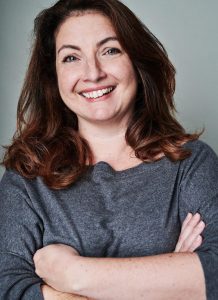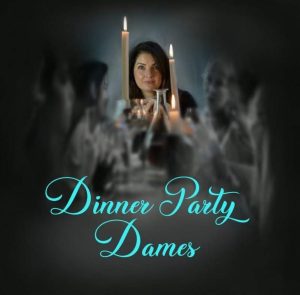Talking About Women’s History: Three Questions and an Answer with Deborah Wastell
Deborah Wastell is an actor, writer, and theatre maker. She is the co-founder and artistic director of “The Female Edit” and in 2022 she created the podcast “Dinner Party Dames” where each episode she talks to a different guest and together they co-host a dinner party where all the guests are interesting women who her co-host would like to invite to their ideal dinner party. She lives in London with her husband and their Miniature Schnauzer, Ripley, named after Lieutenant First Class Ellen Ripley… a strong contender for Deborah’s own Dinner Party guest list.
Take it away, Deborah!
Dinner Party Dames has an unusual format: an imaginary dinner party to which your real life guest issues invitations to women who have had an impact on them–historical current, and occasionally fictional—in response to prompts from you. What inspired you to create this format?
In 2018, for the centenary of women’s suffrage in the UK, I decided to nominate a different woman every day on my social media accounts, and I very quickly realised that the majority of the women who instantly sprang to mind were from specific fields and geographical regions, so I spent a lot of time researching women who had achieved remarkable things from as many walks of life, and in as many different fields, as I could think of. I asked for, and received, loads of suggestions from people who were following the project, and I found out about some astonishing women – the knowledge I gained was not always a lot, but the stories of these women and achievements drew my attention to experiences and questions I’d never really thought about – not because of a lack of interest, but a lack of awareness.
A huge amount of work went into that project, so much so, that once 2018 came to an end, I felt like I wanted to do more with it – or to develop it in some way, but as with so many things, the various ideas of where to go with it were relegated to a notebook alongside many other creative seeds that had been planted over the years – including random notes I’d made after seeing Judy Chicago’s “Dinner Party” in Brooklyn the following January (2019), which I also wanted to use as an inspiration to develop something from.
Both ideas lingered side by side but unrelated, and then about two years later, while I was “Marie-Kondoing” some old notebooks it just suddenly came to me.
It’s one of those questions that pops up, isn’t it? “Who would invite to your ideal dinner party?” And I always love to hear people’s responses – which are very often very male heavy, because most of the history we are taught – whether it be at school, or through literature, cinema, or television is very focussed on men. So what if I asked different people “the dinner party question” but the guests had to be women? I love podcasts, and one of the things I enjoy about them, is the feeling they give you of just having an informal chat with interesting friends, so I liked the idea of creating something that welcomed in, not only the guest, but also these brilliant women, and – hopefully(!) – the listeners too.
I thought the different prompts were a way of making the process of choosing guests a bit less daunting and also a bit more varied for my guests – I figured splitting it up into specific categories was easier than just leaving it totally open ended.
How would you describe the purpose of the podcast?
At its heart, I think the purpose of the podcast is to celebrate women. And to pique people’s interest in women they may never have heard of. The format means that the focus isn’t specifically on history – it can be – it’s very much dependent on the guest, but sometimes it ends up being very contemporary. What I really want is for people to listen to an episode and come away wanting to find out more about the women we’ve talked about, whether that means reading up about historical achievements, listening to music by the women discussed, or watching a movie they directed. And then for them to tell other people about how brilliant these women were.
Do you think Women’s History Month is important and why?
So important. I hope that one day it won’t be. But for now, so many women’s stories are just not told. Whether those stories be individual or collective experiences most of the stories we are told are those of men. Predominantly straight men, and white men. So many of my my guests start off our chats commenting on how “loads of men sprang to mind” but they had to think harder to find a woman to fit the category – and make no mistake, this is not because women have achieved any less than men – in many cases it’s the historical equivalent of the meeting room scenario where a woman will pitch an idea multiple times, only to be ignored or dismissed and ten minutes later a man pitches the same idea to rapturous applause…
Until the day comes when our school history books have as many chapters dedicated to women as there are to men, and our biopics are as likely to have women in the title roles as men, we will need Women’s History Month.
A question from Deborah: When I talk to people on “Dinner Party Dames”, I ask them to choose between six and eight guests. The categories the guest fall into are these:
1) The first woman you remember being inspired by;
2) The woman whose work or ethos has led you to living your life in a certain way (be the influence tiny or huge);
3) A woman who works in your field;
4) A woman who works in a completely different field to your own;
5) A woman you know in real life;
6) A woman who may be considered controversial;
7) An imaginary friend – a character from any form of fiction;
8) A wildcard
At the end of each dinner party I (very cruelly!) tell my guest that only one of the women they have invited can stay behind for an after dinner drink… they can choose any guest other than their real life connection – who would you choose to stay behind at the end of YOUR dinner party, and which category would they have fallen into in the seating plan, and why?
I have to admit, when I listen to your podcast I always think about who I would choose. And now I get to choose! Because obviously I can’t answer the question about which guest I would invite to stay behind without making up my entire list. So if you’ll excuse me for a moment…. Okay, I’m back. I’d invite Harriet Vane, the female foil to Peter Whimsey in Dorothy Sayers’ mystery novels. I’ll put her in the imaginary friend category, though in truth I could just as easily have put her in the influence slot. Certainly her picture of educated women’s lives helped shape my image of the life I wanted.
I’ve read the novels many times over the years. The thing I like about her as a character is that she is unrelentingly herself, even when it isn’t comfortable. You could do worse than sharing a glass of whiskey with a prickly, smart woman at the end of the day.
***
Want to know more about Deborah and Dinner Party Dames?
Check out the podcast: https://dinnerpartydames.buzzsprout.com
Follow her on Twitter: https://twitter.com/dinnerpartydame
Follow her on instagram: https://www.instagram.com/dinnerpartydames/
Follow her on Facebook: https://www.facebook.com/dinnerpartydames
***
Come back tomorrow for two questions and an answer with historian Carol Berkin






